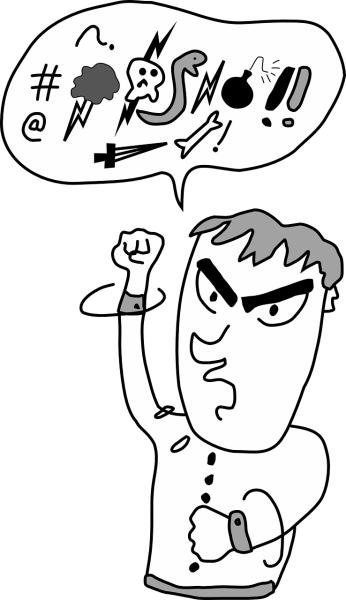Swear words, “bad” words, are found across all cultures and have been with us probably shortly after we developed language. By their nature, they are generally offensive, arousing negative emotions, and “often socially sanctioned, or punished, through a variety of informal and formal mechanisms.”
A Swearing Taxonomy
Before sharing its physiologic value, let us quickly mention how social scientists have thought about swearing.
- Annoyance swearing – negatively charged words, providing emotion and stress relief. Taken to a greater intent, to directly insult or offend, would be abusive swearing.
- Social swearing – designed to meet our gentler needs, including expressing emotions, be they joy or anger, as a means of verbal emphasis or humor, and as a means of “constructing and displaying identity,” social bonding. When used to style or shape our identity, swearing is more frequently viewed positively.
It is clear that swearing is “highly context-dependent,” most often associated with releasing negative emotions or conveying “messages of aggression, hostility, or dominance.”
Swearing is powerful.
“…a uniquely potent means of both achieving catharsis and conveying the speaker’s emotional state to others.” – road warriors have reported that swearing expresses their aggression verbally and provides a bit of catharsis. Studies have found that the primary motivation for swearing in some is to express and thereby release negative emotions and energy.
Swearing brings about the physiologic and cognitive changes we have associated with “fight or flight.” Whether swearing proceeded physiology or physiologic arousal proceeded swearing remains unknown. One hypothesis claims ancient evolutionary factors. Studies using functional Magnetic Resonance Imaging (fMRI) have suggested that our swear words are stored and processed differently than our everyday speech. A small portion of patients with Tourette’s syndrome exhibit uncontrolled and frequent swearing (the medical term is coprolalia), suggesting that the processing lies in those more “primitive” portions of our brain (amygdala and limbic system) that feature automatic, “impulsive,” behavior.
Studies of swearing in the laboratory have demonstrated that swear words
- Increase attention and recall – by “commanding” more attention, swear words are better remembered and, at the same time, interfere with “processing of other stimuli.”
- Heighten autonomic and physiologic responses – studies involving changes in skin conductance of electrical signals, a measure of autonomic arousal, show increased activity from swearing. An increase in heart rate, another measure of autonomic arousal, has been less consistently demonstrated in the lab.
- Produce pain relief – in experiments where participants were asked to keep their hands in freezing water for as long as possible, swearing increased pain tolerance by increasing the threshold for reporting pain and lowering their perception of pain. Not exactly pain medications, but a hypoalgesic response nonetheless.
- Heighten stamina and strength – the repetitive use of swear words was shown to increase muscular performance compared to neutral terms.
Swearing as Language
It is believed that the forbidden quality of swearing heightens its power, especially in the interpersonal sphere. When used among friends, it increases camaraderie, acting as a signal of trust – “I trust you enough to swear in your presence.” The ability of swearing to gain our attention allows it to be used for emphasis, with both the moron driving in front of you or as a stylistic feature of communication with kith and kin.
Linguists have considered what makes swearing so powerful. There is a thought that the sound made by the words themselves provides a portion of their power. More specifically, the plosives of many swear words. Not to worry, I had to look that one up too. Evidently, consonants can create at least two forms of sounds.
“Fricatives are consonants with the characteristic that when they are produced, air escaped through a small passage and make a hissing sound. And plosives are a type of consonant produced by forming a complete obstruction to the flow air out of the mouth.”
For the parents amongst us, swear words are learned just like any other vocabulary, from hearing it from their parents or peers. The power of swearing comes from its taboo nature, which children pick up in several ways, from ‘this is a bad word” to “I’m going to wash your mouth out with soap.”
Perhaps John Ruskin summed up swearing for us:
"Cursing is invoking the assistance of a spirit to help you inflict suffering. Swearing, on the other hand, is invoking only the witness of a spirit to a statement you wish to make."
Or you may prefer the thoughts of Steven Pinker:
I think the reason that swearing is both so offensive and so attractive is that it is a way to push people's emotional buttons, and especially their negative emotional buttons. Because words soak up emotional connotations and are processed involuntarily by the listener, you can't will yourself not to treat the word in terms of what it means.”
Source: The power of swearing: What we know and what we don’t Lingua DOI: 10.1016/j.lingua.2022.103406




